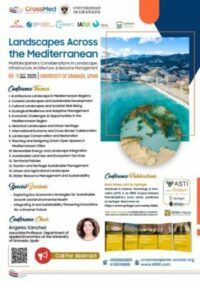ISSN (online): 2076-3298
Call of the Journal:
- Dynamic of Vegetation and Climate Change
- Environmental Implications of COVID-19 Pandemic
- Environmental Sustainability – Life Cycle Assessment – Energy and Environmental Technology
- Groundwater Quality and Groundwater Vulnerability Assessment
- Indoor and Outdoor Air Particulate Matter
- Monitoring and Assessment of Environmental Quality in Coastal Ecosystems
- Monitoring and Management of Inland Waters
- Multiple Approaches for Environmental Assessment of Transitional and Coastal Waters
- Plastic Contamination | Challenges and Solutions
- Response to Current Air Quality Changes in Small and Large Areas
- Restorative Agriculture
- Risk Assessment for Workplace Exposure to Natural Radioactivity
- Rural-Urban Relations and Sustainable Food Systems
- Soil Pollution Assessment and Sustainable Remediation Strategies
Jan
2021
Coastal ecosystems are dynamic, complex, and often fragile transition environments between land and oceans. They are exclusive habitats for a broad range of living organisms, function as havens for biodiversity and provide several important ecological services that link terrestrial, freshwater, and marine environments. Humans living in coastal zones have been strongly dependent on these ecosystems as a source of food, physical protection against storms and the advancing sea, and a range of human activities that generate economic income (e.g., tourism and water sports). Notwithstanding, the intensification of human activities in coastal areas of the last decades, as well as the global climatic changes and coastal erosion processes of the present, have introduced detrimental impacts on these environments. Organic and inorganic pollution, marine anthropogenic litter, destruction, and fragmentation and modification of habitats for multiple purposes, overexploitation of natural resources, introduction of invasive species and loss of biodiversity are among the most common impacts. Maintaining the structural and functional integrity of these environments, as well as recovering an ecological balance or mitigating disturbances in systems under the influence of such stressors, are complex tasks, only possible through the implementation of monitoring programs and by assessing their environmental quality. In this Special Issue, colleagues are invited to contribute original research papers and review articles on all aspects of environmental quality monitoring and assessment of coastal ecosystems, with a focus on biotic or abiotic compartments (or both) and using tools that may range between ecological levels of organization from individuals to the ecosystem.
Keywords: coastal ecosystems; environmental quality and environmental indexes; monitoring and/or assessment programs; environmental disturbances; pressures and stressors; anthropogenic impacts; bioindicators; biomonitors; ecotoxicology and biomarkers; populations; communities and ecosystem responses.
Monitoring and Assessment of Environmental Quality in Coastal Ecosystems
Coastal ecosystems are dynamic, complex, and often fragile transition environments between land and oceans. They are exclusive habitats for a broad range of living organisms, function as havens for biodiversity and provide several important ecological services that link terrestrial, freshwater, and marine environments. Humans living in coastal zones have been strongly dependent on these ecosystems as a source of food, physical protection against storms and the advancing sea, and a range of human activities that generate economic income (e.g., tourism and water sports). Notwithstanding, the intensification of human activities in coastal areas of the last decades, as well as the global climatic changes and coastal erosion processes of the present, have introduced detrimental impacts on these environments. Organic and inorganic pollution, marine anthropogenic litter, destruction, and fragmentation and modification of habitats for multiple purposes, overexploitation of natural resources, introduction of invasive species and loss of biodiversity are among the most common impacts. Maintaining the structural and functional integrity of these environments, as well as recovering an ecological balance or mitigating disturbances in systems under the influence of such stressors, are complex tasks, only possible through the implementation of monitoring programs and by assessing their environmental quality. In this Special Issue, colleagues are invited to contribute original research papers and review articles on all aspects of environmental quality monitoring and assessment of coastal ecosystems, with a focus on biotic or abiotic compartments (or both) and using tools that may range between ecological levels of organization from individuals to the ecosystem.
Keywords: coastal ecosystems; environmental quality and environmental indexes; monitoring and/or assessment programs; environmental disturbances; pressures and stressors; anthropogenic impacts; bioindicators; biomonitors; ecotoxicology and biomarkers; populations; communities and ecosystem responses.
AGRICOLA (National Agricultural Library), AGRIS Agricultural Sciences and Technology (FAO), DOAJ, Emerging Sources Citation Index – Web of Science (Clarivate Analytics), Genamics JournalSeek, GeoRef (American Geosciences Institute),Norwegian Register for Scientific Journals, Series and Publishers (NSD), Scopus (Elsevier) Web of Science (Clarivate Analytics), CLOCKSS (Digital Archive), e-Helvetica (Swiss National Library Digital Archive), Academic OneFile (Gale/Cengage Learning), Google Scholar J-Gate (Informatics India), ProQuest Central (ProQuest), Science In Context (Gale/Cengage Learning), WorldCat (OCLC).
Info at: www.mdpi.com/journal/environments/apc
Guest Editor
Dr. Sílvia C. Goncalves










